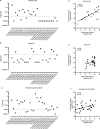The effect of acylation with fatty acids and other modifications on HLA class II:peptide binding and T cell stimulation for three model peptides
- PMID: 29758051
- PMCID: PMC5951580
- DOI: 10.1371/journal.pone.0197407
The effect of acylation with fatty acids and other modifications on HLA class II:peptide binding and T cell stimulation for three model peptides
Abstract
Immunogenicity is a major concern in drug development as anti-drug antibodies in many cases affect both patient safety and drug efficacy. Another concern is often the limited half-life of drugs, which can be altered by different chemical modifications, like acylation with fatty acids. However, acylation with fatty acids has been shown in some cases to modulate T cell activation. Therefore, to understand the role of acylation with fatty acids on immunogenicity we tested three immunogenic non-acylated peptides and 14 of their acylated analogues for binding to 26 common HLA class II alleles, and their ability to activate T cells in an ex vivo T cell assay. Changes in binding affinity associated with acylation with fatty acids were typically modest, though a significant decrease was observed for influenza HA acylated with a stearic acid, and affinities for DQ alleles were consistently increased. Importantly, we showed that for all three immunogenic peptides acylation with fatty acids decreased their capacity to activate T cells, a trend particularly evident with longer fatty acids typically positioned within the peptide HLA class II binding core region, or when closer to the C-terminus. With these results we have demonstrated that acylation with fatty acids of immunogenic peptides can lower their stimulatory capacity, which could be important knowledge for drug design and immunogenicity mitigation.
Conflict of interest statement
Figures







Similar articles
-
Predicting Hemagglutinin MHC-II Ligand Analogues in Anti-TNFα Biologics: Implications for Immunogenicity of Pharmaceutical Proteins.PLoS One. 2015 Aug 13;10(8):e0135451. doi: 10.1371/journal.pone.0135451. eCollection 2015. PLoS One. 2015. PMID: 26270649 Free PMC article.
-
Sequence conservation analysis and in silico human leukocyte antigen-peptide binding predictions for the Mtb72F and M72 tuberculosis candidate vaccine antigens.BMC Immunol. 2015 Oct 22;16:63. doi: 10.1186/s12865-015-0119-7. BMC Immunol. 2015. PMID: 26493839 Free PMC article.
-
A recombinant single-chain human class II MHC molecule (HLA-DR1) as a covalently linked heterotrimer of alpha chain, beta chain, and antigenic peptide, with immunogenicity in vitro and reduced affinity for bacterial superantigens.Eur J Immunol. 1997 Aug;27(8):1933-41. doi: 10.1002/eji.1830270817. Eur J Immunol. 1997. PMID: 9295029
-
Fatty acylated proteins as components of intracellular signaling pathways.Biochemistry. 1990 Mar 20;29(11):2623-34. doi: 10.1021/bi00463a001. Biochemistry. 1990. PMID: 2189494 Review.
-
Challenges in staining T cells using HLA class II tetramers.Clin Immunol. 2003 Jan;106(1):23-8. doi: 10.1016/s1521-6616(02)00018-9. Clin Immunol. 2003. PMID: 12584047 Review. No abstract available.
Cited by
-
A review of lipidation in the development of advanced protein and peptide therapeutics.J Control Release. 2019 Feb 10;295:1-12. doi: 10.1016/j.jconrel.2018.12.032. Epub 2018 Dec 21. J Control Release. 2019. PMID: 30579981 Free PMC article. Review.
-
Preparation and Characterization of Site-Specific Fatty Chain-Modified Recombinant Human Granulocyte Colony Stimulating Factor.Front Bioeng Biotechnol. 2022 May 23;10:923059. doi: 10.3389/fbioe.2022.923059. eCollection 2022. Front Bioeng Biotechnol. 2022. PMID: 35677307 Free PMC article.
-
Site-selective fatty acid chain conjugation of the N-terminus of the recombinant human granulocyte colony-stimulating factor.Front Bioeng Biotechnol. 2024 Mar 18;12:1360506. doi: 10.3389/fbioe.2024.1360506. eCollection 2024. Front Bioeng Biotechnol. 2024. PMID: 38576447 Free PMC article.
-
Acylation, a Conductor of Ghrelin Function in Brain Health and Disease.Front Physiol. 2022 Jun 30;13:831641. doi: 10.3389/fphys.2022.831641. eCollection 2022. Front Physiol. 2022. PMID: 35845996 Free PMC article. Review.
-
Novel enzyme-resistant pancreatic polypeptide analogs evoke pancreatic beta-cell rest, enhance islet cell turnover, and inhibit food intake in mice.Biofactors. 2024 Nov-Dec;50(6):1101-1112. doi: 10.1002/biof.2059. Epub 2024 Apr 18. Biofactors. 2024. PMID: 38635341 Free PMC article.
References
-
- Streng-Ouwehand I, Ho NI, Litjens M, Kalay H, Boks MA, Cornelissen LA, et al. Glycan modification of antigen alters its intracellular routing in dendritic cells, promoting priming of T cells. Elife. 2016;5 doi: 10.7554/eLife.11765 ; PubMed Central PMCID: PMCPMC4811763. - DOI - PMC - PubMed
-
- Madsen CB, Petersen C, Lavrsen K, Harndahl M, Buus S, Clausen H, et al. Cancer associated aberrant protein O-glycosylation can modify antigen processing and immune response. PLoS One. 2012;7(11):e50139 doi: 10.1371/journal.pone.0050139 ; PubMed Central PMCID: PMCPMC3506546. - DOI - PMC - PubMed
-
- Almond RJ, Flanagan BF, Antonopoulos A, Haslam SM, Dell A, Kimber I, et al. Differential immunogenicity and allergenicity of native and recombinant human lactoferrins: role of glycosylation. Eur J Immunol. 2013;43(1):170–81. doi: 10.1002/eji.201142345 . - DOI - PubMed
-
- Purcell AW, van Driel IR, Gleeson PA. Impact of glycans on T-cell tolerance to glycosylated self-antigens. Immunol Cell Biol. 2008;86(7):574–9. doi: 10.1038/icb.2008.48 . - DOI - PubMed
-
- Greer JM, Denis B, Sobel RA, Trifilieff E. Thiopalmitoylation of myelin proteolipid protein epitopes enhances immunogenicity and encephalitogenicity. J Immunol. 2001;166(11):6907–13. . - PubMed
Publication types
MeSH terms
Substances
LinkOut - more resources
Full Text Sources
Other Literature Sources
Research Materials

